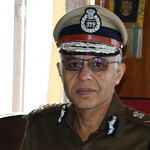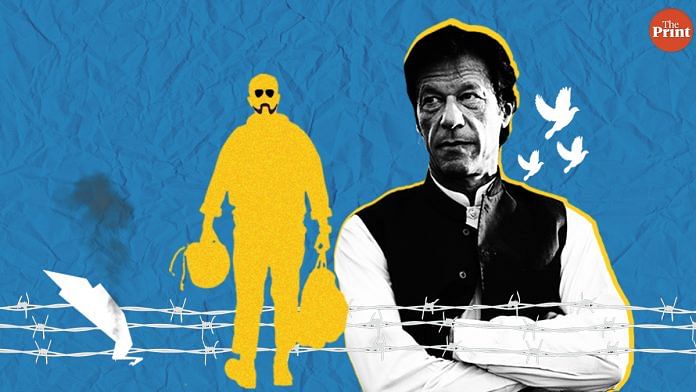Pakistan Prime Minister Imran Khan told parliament that captured Indian Air Force Wing Commander Abhinandan Varthaman will be released Friday ‘as a peace gesture’. Khan said Pakistan wants peace, and added that India should ask why Kashmiri youth are resorting to suicide attacks.
ThePrint: Abhinandan’s return: Has Imran Khan bought temporary peace or must he do more to end terror?
Releasing IAF pilot is Pakistan’s way of diverting attention from the real issue: terrorism
 Avinash Mohananey
Avinash Mohananey
Former IB Officer
Pakistan is carefully managing and calibrating all aspects of the recent conflict to project itself as a peace-loving and responsible member of the international community in comparison to India.
The same has been amply reflected in the addresses to the nation by Prime Minister Imran Khan and the briefings given by Pakistan army spokesperson Maj. General Asif Ghafoor. They sounded reasonable and offered talks to restore peace. The release of Wing Commander Abhinandan Varthaman is part of the same process, aimed more at the international audience.
As a result, Pakistan has been successful in creating a smokescreen and moving the narrative away from the real issue of terrorism that adversely affects India and was the only reason for the conflict. The offer of dialogue by Pakistan without addressing Indian concerns of terrorism is not new and has been rejected by India in the past.
Nevertheless, the return of a pilot by Pakistan has opened a window for both sides to coolly and carefully weigh the wider consequences of what they are doing or proposing to do, keeping in mind their strength and weaknesses — having seen the trailer.
If Pakistan doesn’t mend its ways, the issue of terrorism would raise its ugly head again and continue to haunt the relationship between the two countries.
Propaganda in India is too strong, and it is drowning out the sensible voices
 Zahid Saeed
Zahid Saeed
Former Pakistani diplomat
Imran Khan is an incredibly sincere man. His positive gesture of safely returning the Indian Air Force’s pilot, Abhinandan Varthaman, to India, the positive spirit of this gesture should be appreciated by India.
After the 1971 war, Pakistan released several Indian prisoners but India took over two years to release Pakistani prisoners. Imran Khan could have easily said that India has set the wrong precedent and so Pakistan doesn’t need to release Abhinandan. But he didn’t do that because he has an entirely different approach to these conflicts.
It is sad to see all the hullabaloo that the Indian media is indulging in. They are unnecessarily rammed up and contributing to hate. It is completely out of character and unnatural for Indians to behave like this. They are thinking, sublime people. When Pakistan is extending a hand of peace, then India should respond in similar fashion.
Years have gone by and there is no solution to the Kashmir problem. Use of force in Kashmir by Indian forces is causing people to react by forming militant groups who are fighting for what they believe in. To blame Pakistan for this is a bit far-fetched.
Pakistanis and Indians are not inherent enemies, we can sort this out. The propaganda in India is too strong, and it is drowning out the sensible voices. The alternative will be madness unless this is put an end to immediately.
Pakistan is simply following protocol by releasing Wing Commander Abhinandan Varthaman
 Manvendra Singh
Manvendra Singh
Editor, Defence and Security Alert magazine and member, INC
Pakistan’s gesture of releasing Abhinandan Varthaman is in keeping with the Geneva convention. The convention clearly defines a certain protocol and code of conduct vis-a-vis prisoners of war, and how they must be dealt with. Thus, Imran Khan’s gesture and statement must be seen in exactly that context — Pakistan is simply following protocol.
It should be seen as what it is, nothing more. Of course, in tense times as these, the gesture is surely easing the situation.
However, at the same time, Pakistan needs to demonstrate the steps it will take to put an end to terrorism and terrorist activities on its soil. The sustained menace of terrorism has been detrimental to talks of peace between the two countries.
Pakistan has, time and again, made commitments towards peace and eliminating terrorism from its country. But, it has fallen short of living up to these very commitments, despite PM Imran Khan announcing them on several occasions.
Escalation between India and Pakistan this time around was a result of the Pulwama attack. So, such attacks need to be prevented in the future and only then can actual peace prevail between the two countries.
Imran Khan did what was humanly possible to save the region from war
 Farhan Khan Virk
Farhan Khan Virk
Pakistan Tehreek-e-Insaf member and youth activist
“The first calamity when war comes is truth.” The attitude of Indian political leadership and the media after the Pulwama attack was shocking. While the Pakistan Foreign Office condemned the attack, India began levelling allegations without proof within five minutes of it. Even the video of the suicide attacker, Adil Ahmad Dar, came up at least six hours after the attack but Pakistan was made a scapegoat for the intelligence failure of the Narendra Modi government.
Despite all of this, Pakistan was patient in its approach. Imran Khan asked for proofs so we could investigate the case but we never heard anything from India, except for its media’s war-mongering rants creating a hysteria.
And then Indian planes invaded the Pakistani air space, leaving us in shock once again. After several days of holding back on our right to retaliate, Pakistan downed an IAF aircraft which fell on our side of the Line of Control. Abhinandan Varthaman was about to be lynched by an angry mob but a few military personnel intervened and brought him to safety. He was treated with respect. Abhinandan himself displayed exemplary calm and real professionalism of a solider when he appreciated the Pakistani efforts to rescue him.
Peaceful voices are dwindling across the world. The results lie in the hands of India and on what decision it takes — whether it still wants to escalate or end the matter here. Imran Khan, on his part, has done what is humanly possible to save the region from the calamity of war. Now, we need peaceful voices in India to let better sense prevail in the region.
Even if there is a truce this time, what will happen in case of another terror attack in India?
 Ammara Ahmad
Ammara Ahmad
Lahore-based writer
This is a moment of celebration. Pakistan has taken the first concrete step in the direction of peace between India and Pakistan by first treating Wing Commander Abhinandan Varthaman with dignity and then promising to send him back.
Historically, Indian and Pakistani prisoners of war, and even civilians, who end up in each other’s jails are forgotten, lost in the vast population of local and foreign prisoners sulking behind bars. There was the lurking fear that Abhinandan might become one of them or, worst still, a casualty of a “security slip” as Sarabjit Singh did. Negotiations between India and Pakistan hit an infinitely frustrating stalemate.
The decision of Pakistan Prime Minister Imran Khan to release Abhinandan is a surprise. But then Pakistan has made it amply clear that it is in no mood of war.
Despite this wonderful gesture, there is little evidence that the conflict is de-escalating. Some cities in Pakistan are rumoured to be on high alert and the Indian government has yet to show any signs of softening.
There is one important question. Even if there is a truce this time, what will happen in case of another terror attack in India? Therefore, it is important that if there are any training camps in Pakistan, they should be dismantled. By any means, an attack of the scale and intensity of Pulwama will wreak havoc. Hopefully, Abhinandan will return to Chennai tomorrow, and this looming threat of war will subside for the moment.
Pakistan has continued with its old patterns of deception and denying wrongdoing
 Ajai Sahni
Ajai Sahni
Executive director, Institute for Conflict Management
In just three days since the Indian air strikes at Balakot, it must be clear to anyone not blinded by jingoism and partisan loyalties that the Pakistanis are running circles around the Indian establishment.
A terrorist outrage brought the world to our side, but New Delhi has gone from rage and belligerence, through triumphalism and bewilderment only to return to belligerence, leaving no path open to a face-saving de-escalation.
Pakistan, on the other hand, has continued with its old patterns of deception, denying wrongdoing, then feigning outrage and threatening retaliation after Indian disclosures on Balakot.
After their apparent tactical dominance (we have made claims we cannot substantiate) in the air skirmish along the LoC, Pakistan have now adopted a posture of statesmanlike generosity, declaring that they will immediately free the captured IAF pilot Abhinandan.
Anyone watching international news media, and not the flag-waving frenzy of most Indian channels, can see how the narrative is shifting, with Pakistan – a long-term sponsor of terrorism – presenting itself as the generous and rational player in this conflict, while Indian leaders appear as petulant warmongers. India has failed to go beyond the most facile tactics. As Alvin Toffler expressed it, “If you don’t have a strategy, you are part of someone else’s strategy.” However perverse it is, the Pakistanis have a strategy, and we remain its victims. Balakot has changed nothing.
By Fatima Khan, journalist at ThePrint.




As distinguished a person as Shri Anand Mahindra tweeted his anguish over how some channels were portraying this gesture, hoping nothing would be done that might hurt the process of Wing Commander Abhinandan’s safe return home. 2. See this from Pakistan’s point of view. An ace IAF pilot shoots down an F 16 in aerial combat, and is in turn shot down and captured. Had the situation been reversed, would Arnab Goswami & Co been hectoring the Indian government to release a captured PAF pilot forthwith. So the Pakistanis, in their wisdom, have effected possibly the swiftest release of a military officer in comparable circumstances. 3. Given the state of India – Pakistan relations, the chances of our having got Top Gun back in three days are Zero. Each day he spent in captivity was a burden on the national mood. Others may have helped as well, but it is clear that United States diplomacy has excelled itself, pulling the two nation’s back from a warlike situation. The Saudi Foreign Minister is visiting Pakistan; UAE is playing a constructive role. 4. Once the immediate crisis is averted, there will likely be a serious effort to address India’s underlying and entirely legitimate concerns over cross border terrorism. My view consistently has been that bilateral dialogue will not suffice. Some form of mediation from friends is imperative to stabilise a very dangerous, dysfunctional relationship.